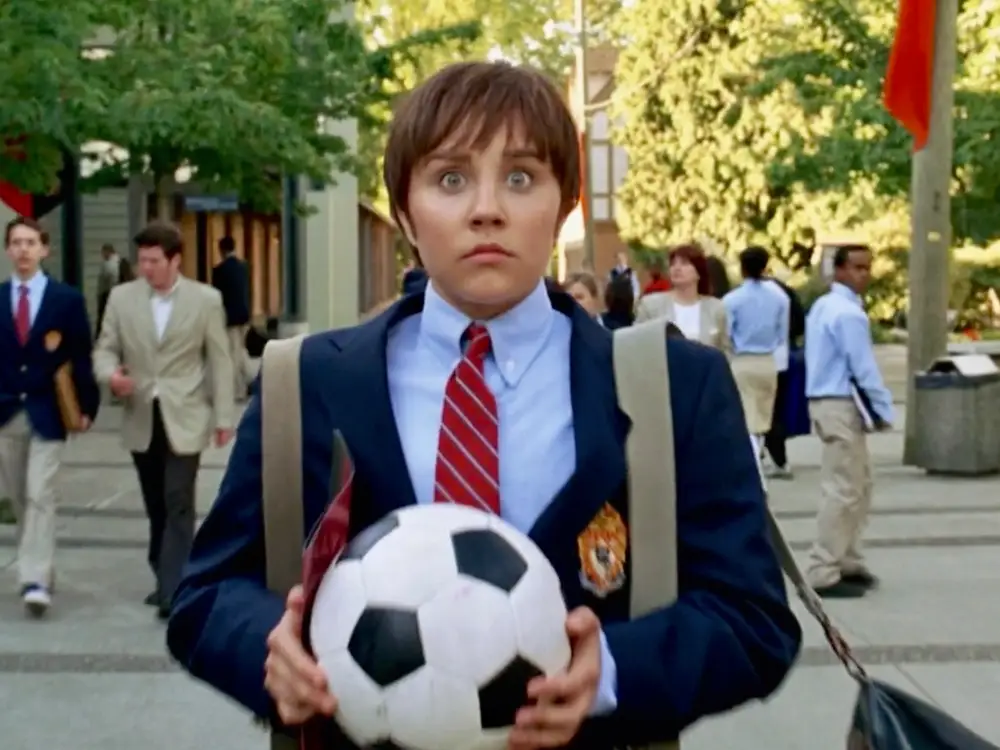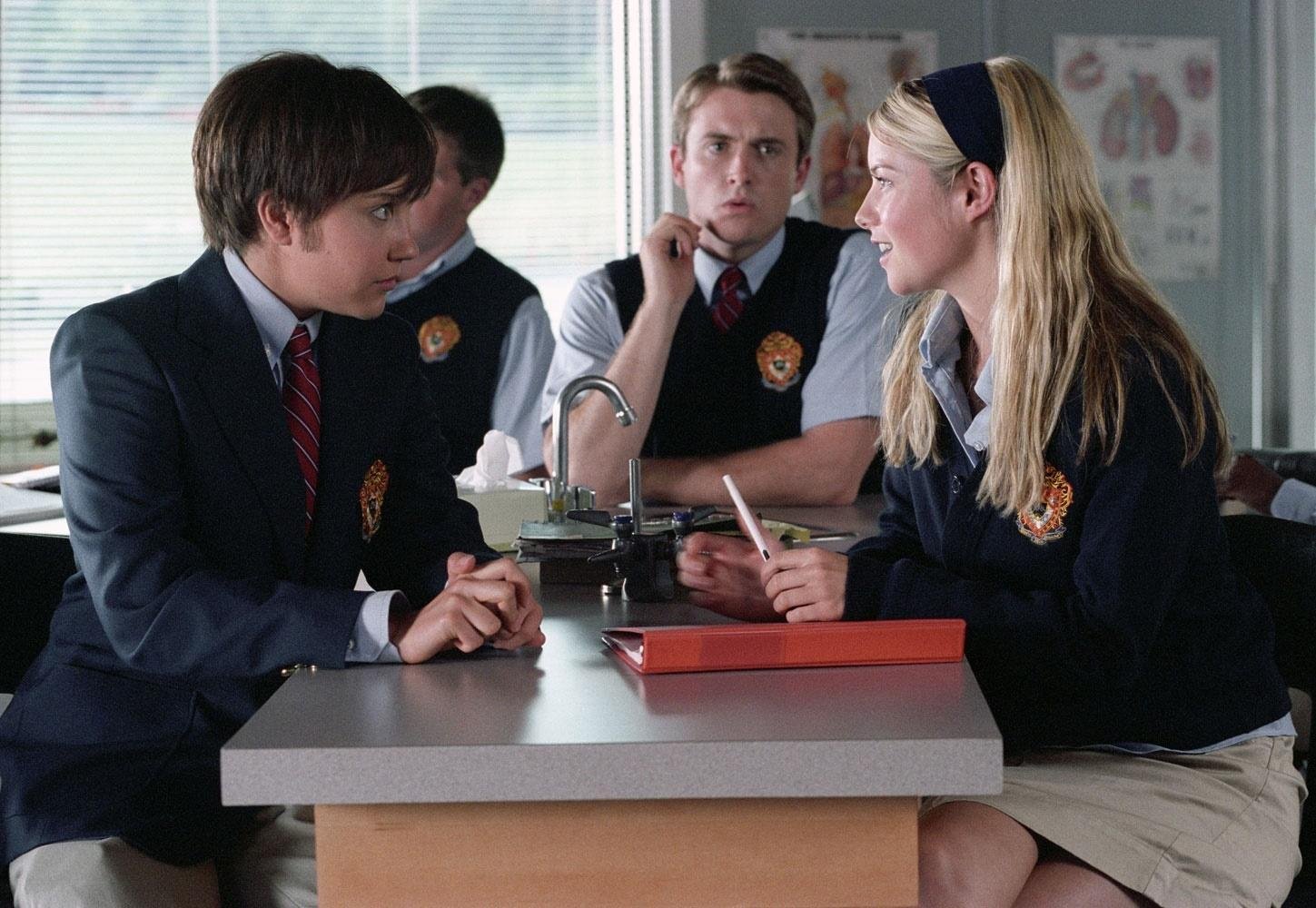‘She's The Man’ - Review
“I need your advice, man. I got lady troubles.” “I’m here for you, bro. I got a lifetime of knowledge.”
When I watched She’s the Man (2006, dir. Andy Flickman) on a whim one night this summer, I expected some 2000s fun, camp, and subtle queer overtones (it is an adaptation of Shakespeare’s “Twelfth Night,” after all). What I wasn’t expecting is to see so many relatable aspects of the transmasculine experience reflected on film.
Granted, I’m not exactly in a place in my transition to where I can relate fully to Viola, the main character of the film who presents as her brother to play for a boys’ soccer team. I’m not necessarily trying to convince cis strangers I’m trans, but have been delighted by the strangers asking my pronouns, as if there’s an imperceptible trans energy I’m releasing. I’ve only started socially transitioning a year and a half ago, and I have been more specifically identifying as transmasc in the past six months. Rather, my transition has largely been associated with wanting my friends and those close to me to see me as a man. In particular, it’s involved begging my male friends in particular to invite me into their social groups.
She’s the Man begins with Viola’s boyfriend telling her that she could never be as good as him at soccer; he’s a man and that’s fixed in biology. Immediately, the film disputes the sense of innate biological differentiation between “manhood” and “womanhood” outside of genitalia and secondary sex characteristics (the latter association gets reinforced in an infamous scene at the end of the movie where characters flash a soccer audience to “prove” their genders). And the film continues to push back against this differentiation. Viola sees an opportunity to prove her boyfriend wrong when she finds out she needs to cover for her twin brother at his new prep school. She decides to enroll in her brother’s place.
Thus, the trans narrative begins. Viola enlists her stylist’s help in order to transform her into a man. Her stylist tells her to watch closely and copy the men around her. What are their styles of clothes? How do they talk to people? She binds her chest. Watches several men walk down the street and copies their walks. Tries on facial hair. A lot of the early moments of “discovering” manhood and its intricate breakdown felt intimately familiar to me.
One moment in particular that sticks out to me is Viola’s elation at completing a “manly” handshake with another man. I do PA and sound recording work on occasion, a very male-dominated field. On one set, a grip said “excuse me, lads” when passing by me and two men on set. The excitement and validation I felt in that moment mimicked Viola’s. However, her elation is immediately undercut with how much a chest bump hurts her breasts. In her first interaction trying to pass, a classmate passes by her and says “what’s up” in a manner that’s an obvious indicator of him recognizing her as a man. When Viola fails to say anything back, she immediately panics, believing her manhood to be compromised. There are several times where a stranger sees me as a man, but immediately changes their response when they hear how high pitched my voice is. She’s the Man nails this ongoing, invisible conversation about gender that happens in the minutiae of everyday interactions.
Viola’s performance and study of manhood gets tested once she’s finally at school. And it’s bizarre. Really bizarre. No one doubts her as a cis man, but she’s awkward. Nerdy. Wiry. Immediately assumed to be young. She hasn’t quite mastered a steady ground on vocal or facial affectations. She doesn’t know how to address her roommates or what language to use. She comes up with absurd excuses to avoid having to shower or go shirtless. And it’s really fun to see that awkwardness at play, as someone who’s still experimenting with what my performance of masculinity looks like.
There’s another clunky moment where Viola mentions that Sebastian’s sister (or herself) “has a great personality” and the men groan. Viola immediately becomes uncomfortable with this misogynistic response that implies looks determine a girl's worth, and the table of men becomes awkward. To help resolve this awkwardness, Viola begins making comments about women to relate to the men, many of them based on what she believes men to talk about. When Olivia, a girl most of the guys have crushes on, comes into the room, Viola remarks, “Check out the booty on that blondie!” Most of the guys laugh along to her comment, but Duke calls her out. I don’t quite like that I relate to this moment, but I do. A few months ago, I was talking to a guy friend about celebrity crushes, and I made a misogynistic comment in this elation of “guy talk” that I immediately regretted. It’s further complicated by the fact that I’ve also been on the receiving end my entire life of misogynistic comments. Thus, in this scene and a similar scene later in the film with Duke calling her out again, She’s the Man depicts a dichotomy of trans manhood that’s difficult to acknowledge; manhood is associated with misogyny and, without generalizing too much, most trans men have been on the receiving end of misogyny in their lives. This dichotomy prompts a need to define a manhood outside of misogyny informed by our experiences. It isn’t until Viola reveals her “feminine” interests, such as clothes, with Olivia that she feels comfortable being a man. It’s clear Viola adopts a more comfortable gender performance when she’s not trying to shun away femininity whatsoever.
This scene also reveals another interesting theme throughout the film; gender is validated through the opposite sex. The movie goes hardest with the theme in an early scene, where the hairdresser hires multiple women to go up to Viola and tell her that she’s a wonderful lover, but understanding that she’s too much man to handle one woman. After that, Viola becomes a legend with her male friends. In the end, gender is always reinforced by heterosexuality. When I first started exploring my trans feelings, I identified as a lesbian. Weirdly, my gender felt affirmed when I had a crush on a guy and those feelings of manhood didn’t go away. I think it’s also interesting that Viola does not study her (obviously coded-to-be) gay stylist in her scholarly pursuit of manhood. Manhood is defined by straight manhood, which feels both relatable (as I like girls) and not relatable, as my sexuality has been shunned for most of my life for being a “queer” sexuality.
There’s a “blink-and-you’ll-miss-it” scene in the middle of the film that reads like a Judith Butler text on gender performativity. Viola is practicing flirting with Duke, and she roleplays as Olivia. Duke remarks how scarily easy it was for her to pass as a woman, and she tells him she’s pretended to be her sister throughout her life. The trans man in me finds the phrasing of “pretending to be my sister” interesting. There’s a sense of pretending inherent to transness that’s recognizable in this movie, even if Viola is really just pretending to be Sebastian. This film explores how full the performance of pretending is.
A devastatingly relatable aspect to the movie, that’s not specific to transness but any gender nonconformity, is the mother’s insistence on femininity from Viola. Her mother is desperate for Viola to become a debutante and is frustrated by her masculine interests. When Viola wears a pretty dress for the kissing booth, the mother remarks, “You look like such a lady; it’s wonderful!” I immediately think of my mother commenting on my figure that I wish to change with hormones. I think about her disappointed voice asking if I’m going to shave my legs before a fancy event. This rejection of femininity is reflected in her nightmare of being forced to play soccer in a debutante dress; her contrasting gender experiences are at odds with each other.
The rest of the film is just fun Shakespearean shenanigans and Channing Tatum proving his comedic prowess in a queer-coded role (like he would later do in the Jump Street series). But those strings of studying manhood, exploring manhood’s complicated relationship with patriarchal structures, and showing a gender-crossing narrative that extends thematically beyond the usual “haha dressing as the opposite gender” joke is unexpectedly powerful. There’s also not an abundance of transmasculine film, much less in larger pop culture. So it’s wonderful and unexpected to watch this gem of a 2006 comedy depict moments of my transmasculine experience so well.










